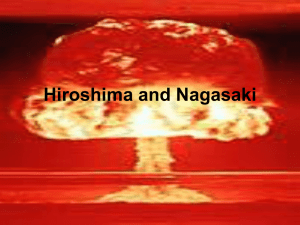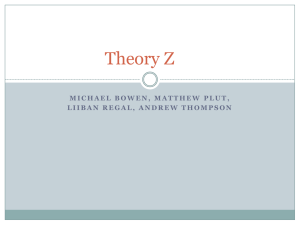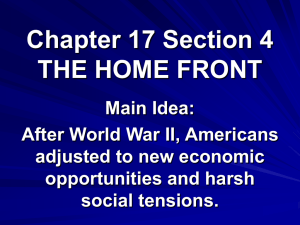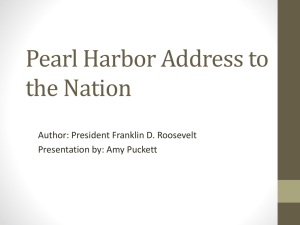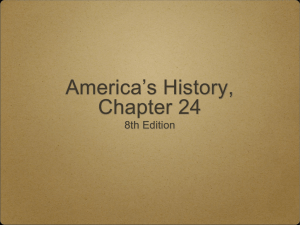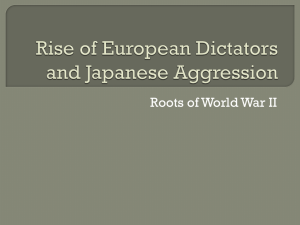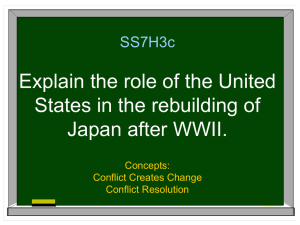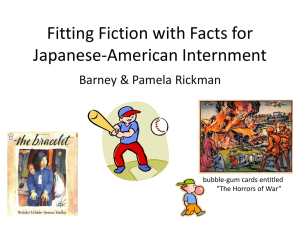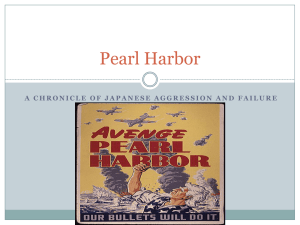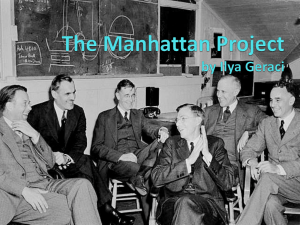Chapter 17 Section 3
advertisement
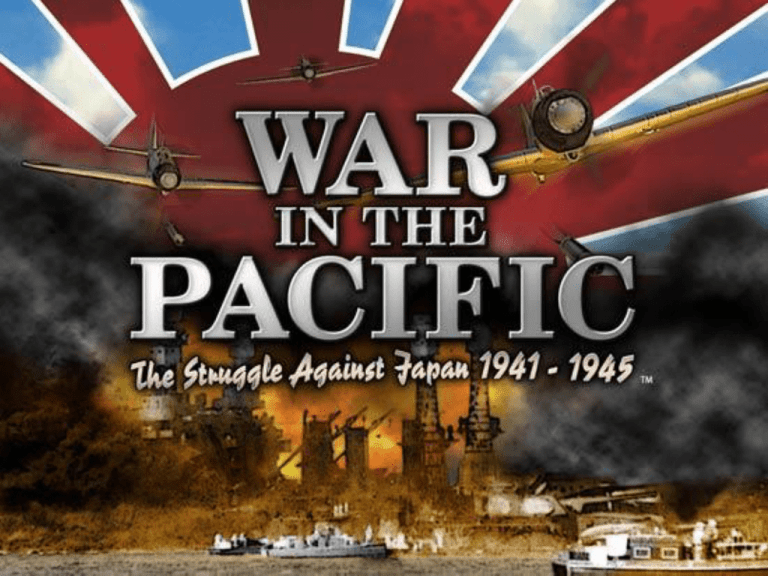
Allies Stem Japanese Tide • Priority was to defeat Nazis, but US did not wait to move against Japan • US submarines still existing • US aircraft carriers were at sea during attack on Pearl Harbor Japanese Advances • 1st 6 months after Pearl Harborconquered empire that dwarfed Hitler’s • Conquered most of South Pacific-as far west as Aleutians-part of Alaska Japanese Advances • Philippines-80,000 Americans commanded by General Douglas MacArthur-held out against 200,000 Japanese for 4 months Japanese Advances • 14,000 killed, another 48,000 wounded • MacArthur eventually had to abandon Philippines- “I shall return” • Japanese military dazzled by their success • Now had 150 million new subjects spread over 1/7th of the globe US Retaliation • 4/18/42-16 bombers led by James Doolittle take off of USS Hornet • Bombed Tokyo military targets • Boosted American morale, caused concern among the Japanese US Retaliation • May 1942- US and Australian forces intercept Japanese fleet targeting Australia-Battle of the Coral Sea • New Warfare-all fighting done with carrier-based planesopposing ships never saw each other US Retaliation • Allies lost more ships than Japanese • Japanese fleet too short of fuel to continue to Australia1st time Japanese had been stopped • Moral victory for the US Battle of Midway • June 1942- Chester Nimitz-commander of American forces in Pacific- learned Japanese invasion force heading for Midway then on to Pearl Harbor • 110 Japanese ships – Largest assemblage of naval power in history Battle of Midway • US outnumbered 4 to 1-prepared a surprise for Japanese at Midway • Americans ordered to inflict maximum damage on the enemy Battle of Midway • Japanese lose 4 aircraft carriers, a cruiser, 322 planes • Americans avenged Pearl Harbor Island Hopping • Lots of distance between island on in the Pacific • Japanese troops dug in on hundreds of islands • Taking each island would be long and costly Island Hopping • Americans “leapfrogged” Japanese strongholds • Seized less-fortified islands, built airfields, used airpower to cut Japanese supply lines • Starved out Japanese strong points Island Hopping • 1st land offensive of Japanese warGuadalcanal in Solomon Islands • 19,000 marines • 6 months laterJapanese leave • 1st Japanese defeat on land Island Hopping • October 1944178,000 Allied troops & 738 ships converge on Leyte Island in the Philippines • Japanese throw entire fleet into the battle • Japanese introduce kamikaze-suicide plane Island Hopping • In the Philippines424 kamikazes-sunk 16 US ships and damaged another 80 • Leyte Gulf a disaster for Japan – – – – Lost 3 battleships 4 aircraft carriers 13 cruisers 400 planes Island Hopping • Americans next turned to Iwo Jima • US could use this a s abase to attack Japan • Most heavily defended spot on earth • 20,700 Japanese dug into Iwo Jima – 6,000 marines died taking Iwo Jima Island Hopping • 200 Japanese survived • Last obstacle was Okinawa By the way… • April 12, 1945-FDR dies • Harry Truman becomes president Okinawa • Japan’s last defensive outpost • Unleashed 1,900 kamikazes • Sunk 30 allied ships • Killed 5,000 US sailors Okinawa • Fighting ends June 22, 1945 • More than 7,600 Americans died • 110,000 Japanese die • If Okinawa was defended this fiercely, what would an invasion of Japan be like? • Churchill predicted 1million American lives and 500,000 British Manhattan Project • Manhattan Projectproject to develop the atomic bomb • Most ambitious scientific project in history • Best kept secret of he war • More than 600,000 Americans were involved in the project-few actually knew the purpose Manhattan Project • Work on atomic bomb began in 1942 • Group of scientists under direction of J. Robert Oppenheimer worked in a secret laboratory to build the actual bomb Manhattan Project • Many concerns surrounding atomic bomb – Would it even work? – If it did, would it be very strong? – Would it set fire to the atmosphere? – Would it destroy the earth? Manhattan Project • July 16, 1945-1st atomic bomb detonated in New Mexico • Blinding flash visible from 180 miles away • Bomb more powerful than anticipated To Bomb or not to Bomb • Many scientists said it would be immoral to drop the bomb without fair warning • Others wanted to give the Japanese a demonstration of the bomb • Problems with a test explosion: – Nothing less than dropping a bomb on a city would convince Japanese to surrender – The test might be a dud – Japanese might shoot down delivery plan – May move American prisoners to the test area To Bomb or not to Bomb • Decision was made to drop the bomb without warning • Why? – Save American lives – Weapon needed to be used to justify cost of building it – Give Americans advantage over the Soviet Union in shaping the post war world To Bomb or not to Bomb • US warns Japan that it faced “prompt and utter destruction” unless it surrendered • Japan refused Hiroshima and Nagasaki • August 6, 1945 – Enola Gay released atomic bomb code named Little Boy over Hiroshima • an important Japanese military center • 43 seconds later, the city collapsed to dust • Japanese leaders still hesitated to surrender Hiroshima and Nagasaki • August 9, 1945- a second atomic bombFat Man- was dropped on Nagasaki • Leveled half the city • By the end of 1945200,000 people had died due to the atomic bombs Hiroshima and Nagasaki • September 2, 1945Japanese formally surrender on board the USS Missouri Preparing for Peace • Yalta ConferenceFebruary 1945 • Attended by FDR, Stalin and Churchill • Created the United Nations-and international peacekeeping body Preparing for Peace • Also at Yalta-Stalin promises to enter the war against Japan • In exchange for: – Kuril and Sakhlin Islands • Stalin also promised to allow free elections in Poland and other Soviet occupied nations Preparing for Peace • July 1945- Potsdam Conferendce • Attended by Truman, Stalin, and Atlee (new British PM) • Created plan to disarm Germany & eliminate Nazis Nuremberg Trials • 22 Nazi officers and govmt. Officials put on trial • 12 sentenced to death • For the 1st time in history, a nation’s leaders had been legally held responsible for their actions during war Occupation of Japan • Occupied by US forces • Under command of Douglas MacArthur • Tojo arrested and sentenced to death • More than 1,100 Japanese put on trial Occupation of Japan • Occupation lasted 6 years • MacArthur installed a democratic government • Japanese constitution still known as the Macarthur Constitution
